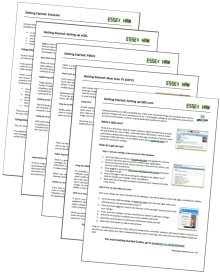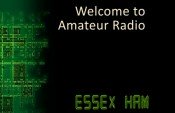 At Essex Ham, we know that once you’ve got your licence, taking the next steps can be tricky – we’ve all been there. To help out, we’ve put together some handy Amateur Radio Getting Started Guides, available as web pages or PDF files.
At Essex Ham, we know that once you’ve got your licence, taking the next steps can be tricky – we’ve all been there. To help out, we’ve put together some handy Amateur Radio Getting Started Guides, available as web pages or PDF files.
On this page, you’ll find links to our various “How to” guides created for those new to the hobby, as well as links to some of our training material.
We’re in the process of creating some additional content for this section, and you might be able to help: If you’re an M6 or M3, let us know what guides would you like us to add. If you’re interested in contributing an article to help newbies, we’d welcome your submissions, which will help others. Please Get in touch
Thinking of joining the hobby?
- Check out our “Getting Started in Amateur Radio” video
- See our “Become a ham” section
- Son or daughter interested? Notes for parents
Already in the hobby?
Here’s our collection of guides. Also, take a look at our Amateur Radio FAQ for some tips.
| Basic Guides | ||
| Get Your Callsign | Just passed your Foundation? How to get your licence and callsign | PDF (Essex) |
| Just Licensed? | You’ve got your callsign, so what do you do next? | – |
| Which radio should I buy? | Some things to consider when buying your first amateur radio transceiver | PDF File |
| Your First Handheld | What can you expect from your first handheld, and how can you improve on the experience? | PDF File |
| Set Up Your Station | Got your licence and looking to get your first radio? We offer some ideas and tips. | PDF File |
| A Parent’s Guide | Son or daughter taking up the hobby? What you need to know! | PDF File |
| Using Repeaters | Want to start using your local repeater? Here’s our guide to the basics | PDF File |
| VHF QSO Script | Here is a script for a basic VHF simplex contact. You can also take a look at our short VHF QSO example video | PDF File |
| Set Up QRZ | How to get your callsign registered with the QRZ.com website | PDF File |
| eQSL Basics | Starting out into the world of electronic QSL cards | PDF File |
| Operating Hints | Some suggested Dos and Don’ts for operating on-air | PDF Files |
| EMF Assessments | Advice on how to comply with Ofcom’s EMF requirements | PDF Files |
| Introduction to HF | Part 1: The HF Bands – A look at what to expect from each of the HF bands | PDF File |
| Part 2: Selecting a Transceiver – What to consider when buying your first rig | PDF File | |
| Part 3: Aerials – A look at feeders, HF aerials, and options for what may work for your shack | PDF File | |
| SOTA – The basics | What is Summits On The Air, and how to get started | – |
| 2m SSB Contests | Thanks to Terry G3VFC for this guide on the monthly 2m SSB contests | – |
| Working Portable | A handy checklist on what to make on a field day | PDF File |
| D-Star Basics | A short introduction to D-Star (Icom’s digital voice mode) | – |
| EchoLink Basics | A hands-on guide covering how to use Echolink | PDF File |
| Foundation Glossary | A selection of terms and abbreviations you may experience when studying for the Foundation exam. | PDF File |
| Data Modes Guides | ||
| Data Modes Basics | The basics on getting started with the various data modes and what you’ll need to get started | PDF File |
| PSK31 Basics | Getting Started with this popular digital mode. Also – check out our free EssexPSK application – the easy-to-use PSK31 and RTTY decoder | PDF File |
| FT8 – The Basics | Information on how to get started with the FT8 data mode | – |
| JT65 – The Basics | Information on how to get started with the JT-65 data mode | – |
| SSTV Basics | Information on how to send and receive images using Slow Scan TV | PDF File |
| Troubleshooting Data Modes | Help and advice on resolving problems sending and receiving data | – |
| Balloon Tracking | Details on how to track high altitude balloons | PDF File |
Video Guides
 What is Amateur Radio? |
 Amateur Radio Rallies |
For more videos, see the Essex Ham Videos page
Related Content
Need Help?
See our Amateur Radio FAQ for some tips, or ask in our forum
Amateur Radio Training Material
- Our Foundation Training Material and slides
- Essex Ham Amateur Radio Training Material
- Some handy Amateur Radio Training Links
Got a suggestion for a guide we should add? Please let us know in the comments section below.


I think you need a list of essex repeaters on here as essex is blessed with 8 repeaters so i would say maybe might be worth listing the repeaters. For example not many people know about GB3OY (it shows a strange 7.5mhz split) which sits on the essex / london boarders. Even GB3HW (its a bit of a funny old one as its london but its kinda essex.
Good suggestion Mitchell – First pass at a page of Essex repeaters can now be found here: https://www.essexham.co.uk/essex-repeaters – At the moment, the list is only for those in Essex, but as you say, loads of repeaters in Kent, London, Herts and Suffolk that overlap Essex nicely.
Excellent work.
Congratulations – well thought out, easily understood and long overdue.
Many thanks Bob and Patrick for the positive feedback. More guides on the way soon!
Hi Pete – I was reading through some old RadComs and found your letter “Encouraging the M6s”. I have just checked your getting started page and found the the link for a simplex VHF QSO points to the repeater page. The PDF file is OK, so no great harm done, but I guess you would want to fix it…
Steve, G4GHO
Indeed thanks Steve – Now fixed. There’s only a PDF for the VHF QSO (no actual page), so I’ve removed the link. Should be OK now. Thanks for letting me know.
Hi Pete. In your doc. on Setting up a VHF QSO link there is a line about finding a vacant channel/frequency. Are there certain frequencies/channels, or will any freq. do?
What you have put together here, I think is pretty fantastic.
Thank you.
Michael G0 IEQ
Hi,
Will you be reordering the TYT MD-38D DMP (preprogrammed) radio ?
Kind regards,
Roger
We don’t sell any radios. HamGoodies were supplying pre-programmed TYT-380s, but are currently out-of-stock as a new model is on the way. You can by the TYT-380 unprogrammed, with lead, and program yourself using an existing free codeplug though. See https://www.essexham.co.uk/redirect.php?id=tyt380amazon
This is such a good Idea it is well worth rolling out nationally….
Hi. At the Canvey Ralley you had some laminated band plans which, on enquiring, I was told that they would be on the site and available to download but I cannot find them. I’d be grateful if you could point me to them if they have been uploaded.
Kind regards,
Stuart (G6RAQ)
Hi how can I make a donation
Many thanks
Robert
Does the Foundation license have a practical element to it or is the only requirement the 26 question exam paper?
Good evening,
This is Paul M7TZX from Durham in the North of England, Please can I ask if you have a video on tuning a hf frequency, as I’m really struggling with this, I got my Licence ln March and I’m still trying to contact people on 2m and hf with no joy, I have gone through the getting started guides, and still not getting anywhere, I bought all new equipment so it would work, but I just can’t work out what I’m doing wrong.
Can you help?
Many Thanks Paul.
Hi Paul, it’s all a mystery, but I think it is suposed to be. Let me know how you get on? ps I wonder how CB works, it must be easier than this.
Will you be running any Morse boot camps this year?
Thank you Mike M0AZE
hi, how many times can someone take a foundation exam?
As many times as you need – there is no limit, but there is a fee each time (currently £32.50)
So I got my licence, many thanks to Sxhams. Now what? Programme my radio to use a repeater urhh!? Try rsgb, there is a famous repeater in Kent, where is that?
What you decide to do now that you’re licensed depends on what aspect of the hobby interests you most – working the world on HF, talking to locals on VHF/UHF, working data modes, setting up portable stations, space comms, construction, contests, digital operation, or just socialising. Loads of options, and if you need help and advice, just ask.